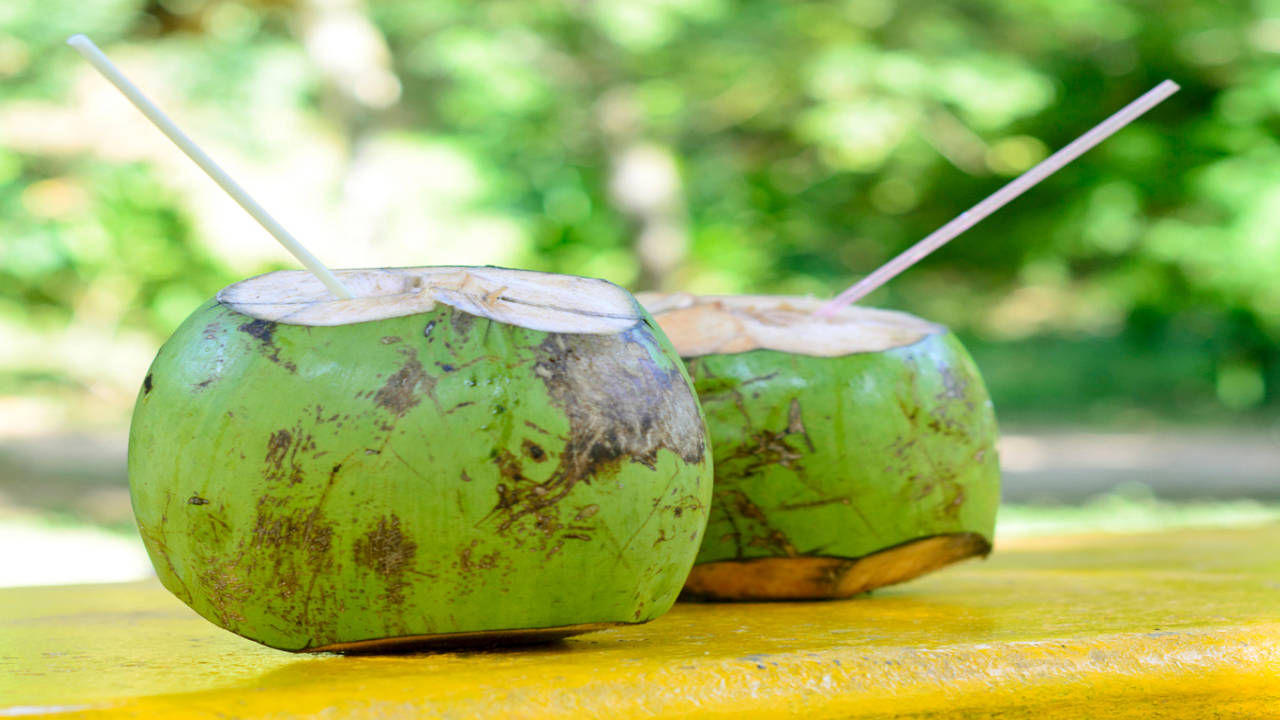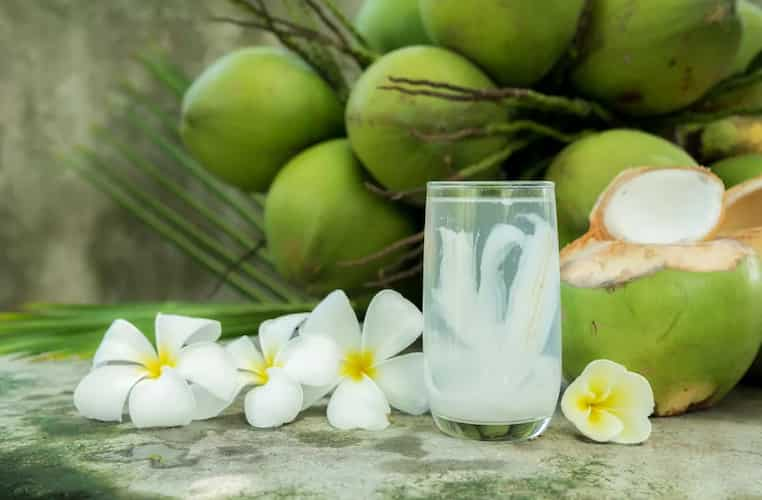Coconut water, the clear liquid found inside young, green coconuts, has become an increasingly popular beverage in recent years. Its refreshing taste, natural sweetness, and purported health benefits have made it a favorite among health-conscious consumers. But what is it about coconut water that has captured the hearts and taste buds of so many? Let’s delve into the reasons behind coconut water’s newfound popularity.
Contents
Exploring the Reasons Behind Coconut Water’s Popularity

There are several factors that have contributed to the rise of coconut water as a popular beverage. From its natural hydration properties to its refreshing taste and potential health benefits, let’s take a closer look at why coconut water has become such a sought-after drink.
Natural Hydration
One of the main reasons for coconut water’s popularity is its natural hydrating properties. Coconut water is naturally high in electrolytes, such as potassium, magnesium, and sodium, making it an ideal choice for rehydrating after exercise or on a hot day. These electrolytes are crucial for maintaining proper bodily functions and are often lost through sweating during physical activity.
A study published in the Journal of Physiological Anthropology found that coconut water was just as effective as sports drinks in rehydrating athletes after exercise. However, unlike most sports drinks, coconut water contains less sugar and no artificial flavors, making it a healthier option.
Along with providing hydration, coconut water also has a high water content (around 95%), which can help keep the body cool and prevent dehydration.
To stay hydrated and refreshed, consider swapping your sugary sports drink for a natural and nutritious alternative like coconut water.
Refreshing Taste
Another reason behind coconut water’s popularity is its distinctively refreshing taste. Unlike other flavored drinks, coconut water has a unique nutty and slightly sweet flavor, with a hint of coconut. This makes it a versatile beverage that can be enjoyed on its own or used as a base for smoothies, cocktails, and other drinks.
Moreover, coconut water is naturally low in sugar (around 4-6 grams per 8 ounces), making it a healthier option compared to other sweetened beverages. It also contains no added preservatives, making it a natural and pure drink.
So, if you’re looking for a tasty alternative to plain water, coconut water is a delicious and nutritious option.
Dissecting the Refreshing Nature of Coconut Water

Apart from its taste and hydrating properties, there are several other factors that contribute to the refreshing nature of coconut water.
Natural and Pure
Coconut water is extracted directly from young, green coconuts, making it a pure and natural beverage. Unlike many other drinks on the market that contain added sugars, preservatives, and artificial flavors, coconut water is free from these additives. This makes it a healthier option for those looking to avoid processed foods and ingredients.
Moreover, coconut water is also gluten-free, dairy-free, and vegan, making it suitable for a wide range of dietary preferences and needs.
Easy to Digest
Another reason why coconut water is so refreshing is that it is easily digestible. Due to its high water content and natural electrolytes, coconut water can help prevent and alleviate gastrointestinal issues like constipation and bloating.
Moreover, coconut water is rich in fiber, which is essential for maintaining a healthy digestive system. It also contains enzymes that can aid in digestion and improve overall gut health.
So, next time you’re feeling bloated or experiencing digestive discomfort, consider reaching for a glass of coconut water to help soothe your stomach.
Unveiling the Taste Attributes of Coconut Water
As mentioned earlier, coconut water has a unique and refreshing taste, but what exactly gives it this distinct flavor? Let’s explore the various taste attributes of coconut water.
Sweetness
Coconut water has a mild sweetness that is appealing to many people. This sweetness comes from natural sugars, such as fructose and glucose, found in the coconut.
The level of sweetness may vary depending on the maturity of the coconut. Younger coconuts tend to have a milder and sweeter taste, while more mature coconuts can have a stronger, less sweet flavor.
Nuttiness
One of the defining characteristics of coconut water is its nutty taste. This flavor comes from the presence of amino acids, which are naturally occurring compounds that give foods their distinctive taste.
The amount of amino acids present in coconut water can also vary depending on the age of the coconut. Younger coconuts tend to have higher levels of amino acids, leading to a stronger nutty flavor.
Hint of Coconut
As the name suggests, coconut water does have a subtle hint of coconut flavor. This comes from the natural oils found in the coconut’s meat or flesh. These oils infuse into the water during the maturation process, giving it a mild coconut taste.
However, the coconut flavor in coconut water is not as strong as that of coconut milk or cream, which are made by blending the coconut’s meat with water.
Evaluating the Health Benefits of Coconut Water

Apart from its delicious taste and refreshing nature, coconut water is also touted for its potential health benefits. However, not all of these claims are supported by scientific evidence. Let’s take a closer look at some of the scientifically proven health benefits of coconut water.
Hydration and Electrolyte Balance
As mentioned earlier, coconut water is an excellent source of electrolytes, making it an ideal choice for staying hydrated. These electrolytes are crucial for maintaining fluid balance and proper bodily functions, including muscle contractions and nerve impulses.
Moreover, coconut water contains no added sugars or artificial ingredients, making it a healthier option compared to sports drinks, which often contain high amounts of sugar and additives.
Lower Blood Pressure
Some studies have shown that drinking coconut water may help lower blood pressure levels. A study published in The West Indian Medical Journal found that coconut water was effective in reducing systolic blood pressure in individuals with hypertension.
Additionally, a meta-analysis of 5 studies concluded that coconut water has a significant effect on lowering diastolic blood pressure, especially in people with high blood pressure.
However, more research is needed to fully understand the effects of coconut water on blood pressure and its potential long-term benefits.
Heart Health
Coconut water has also been linked to improved heart health. A study published in the Journal of Medicinal Food found that coconut water had cholesterol-lowering effects in rats fed a high-fat diet. Another study published in the Journal of the American College of Nutrition found that coconut water had antioxidant properties that could protect against oxidative stress in the heart.
While these studies show promise, more research is needed to determine if similar effects can be seen in humans.
Immunity Boost
Coconut water contains vitamins, minerals, and antioxidants that can help boost the immune system and fight off infections. One study showed that coconut water had antimicrobial properties and could potentially inhibit the growth of harmful bacteria and viruses.
Moreover, the high vitamin C content in coconut water can also help support immune function.
However, it’s important to note that coconut water should not be used as a replacement for medical treatment when suffering from an illness or infection.
Conclusion
There’s no denying that coconut water has gained immense popularity in recent years, and for good reason. Its refreshing taste, natural hydration properties, and potential health benefits make it a unique and appealing beverage choice.
Whether you’re looking for a healthier alternative to sugary drinks, a tasty way to stay hydrated, or a potential boost to your immune system, coconut water is a delicious and nutritious option to consider. So, next time you’re at the store, grab a bottle of coconut water and enjoy its refreshing nature.

